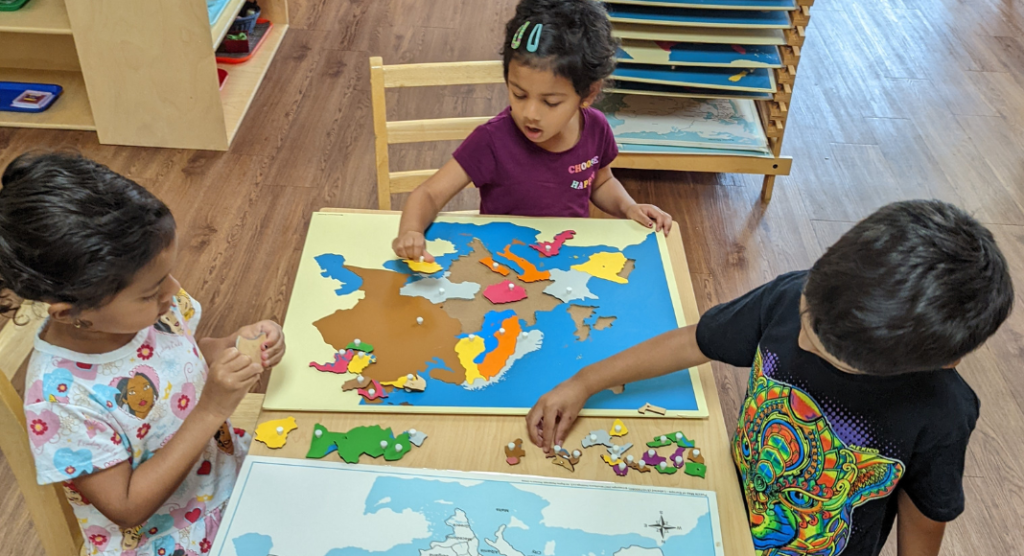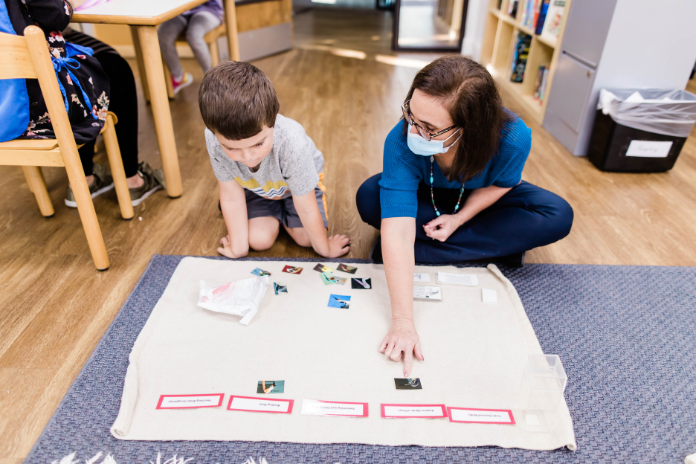Disclaimer :: This article is sponsored by Wonderland Montessori to bring you information on Montessori education.

At this point in your parenting journey (and in your life), you’ve certainly heard mention of Montessori school. But unless you’ve had personal experience with one, you may not know exactly what Montessori entails. Let’s remedy that right now with help from Wonderland Montessori.
1. What’s the difference between a Montessori school and a traditional school?
First of all, it’s entirely different. Classes are designed for kids to learn at their own, individual paces (from activities they choose themselves). Montessori teachers keep detailed records on each child, so they know when it’s time to introduce a new skill or concept. This methodology is backed by research and follows the worldwide standards set by the Association Montessori Internationale.
Class structure is also different: Montessori classes are comprised of three-year age groups (e.g., three – six, six – nine, nine – 12). Older children end up sharing knowledge with younger ones, and it becomes a special kind of community.
2. If children work at their own paces, will they fall behind?
It’s all about the Montessori guide (i.e., the teacher). The guide closely observes each child and makes materials and activities available to help children progress. So, while children choose what they want to explore, the options available are chosen by the guide.
This gentle guidance helps kids master challenges — and protects them from moving on before they are ready, which is what actually causes children to “fall behind.”
FYI: Montessori classrooms are designed to help all children (those who are gifted as well as those with learning disabilities) reach their full potential at their own paces.
3. Is Montessori based on a religion?
Nope. It’s religiously neutral and doesn’t conflict with any religions. The staff and students at Wonderland Montessori are diverse in origin, culture, and religion.

4. With all this freedom, is there a curriculum at Montessori school? How does that work?
Montessori has a rigorous academic program that teaches all the usuals: math, science, language arts, history, geography, etc. It’s the integrated approach to learning that differs. Here’s an example from Wonderland Montessori:
“While studying a map of Africa, for example, students may explore the art, history, and inventions of several African nations. This may lead them to examine ancient Egypt, including hieroglyphs and their place in the history of writing. The study of the pyramids, of course, is a natural bridge to geometry. This approach to curriculum shows the interrelatedness of all things. It also allows students to become thoroughly immersed in a topic — and to give their curiosity full reign.”
5. How is academic progress tested?
You want to know your child is progressing, and you want to know they’ll be successful outside a Montessori environment. While there are no “grades” at Montessori school, guides keep detailed records on each child about academic progress, happiness, maturity, and love of learning. And you’ll be kept in the loop on all of it.
Here’s one more bit from Wonderland Montessori:
“In addition to scoring well on standardized tests, Montessori children are often above average on such criteria as following directions, turning in work on time, listening attentively, using basic skills, showing responsibility, asking provocative questions, showing enthusiasm for learning, and adapting to new situations.”
Every parent’s dream!
If this sounds like a good fit for your family, be sure to check out Wonderland Montessori School. Check the “Locations” tab on its site to find the one closest to you!
Wonderland Montessori Programs:
- Nido | two – 18 months
- Toddler | 18 – 36 months
- Primary | three – six years
- Elementary | six – 12 years
- Before- and after-school care













